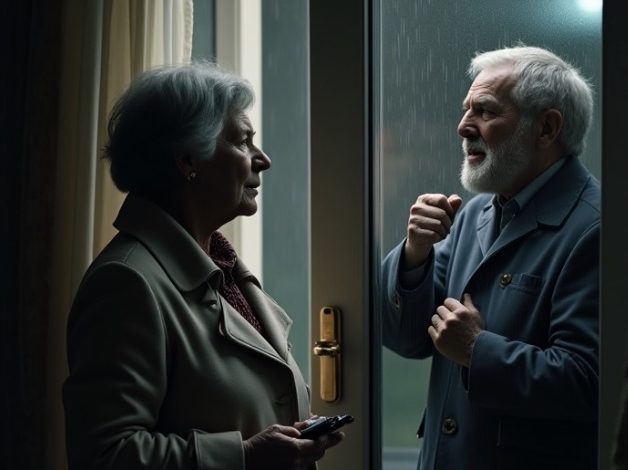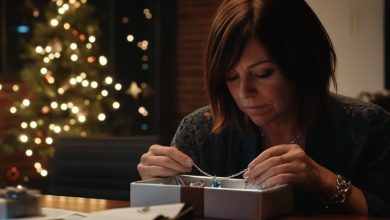“The Gas Station Flowers, the Diamond Bracelet, and the Call That Changed Everything I Believed”

After twenty-seven years of marriage, I thought I knew my husband. I thought I understood the man who shared my bed, the man whose breath I heard every night as we drifted to sleep. We had been through so much together—tight budgets, sickness, raising children, long nights waiting for him to return from the road. So when Henry came home on my sixty-eighth birthday with a tired smile and a wilted bouquet from a gas station, murmuring, “We’re broke, Lil. I’m sorry, this was all I could get,” I forced myself to swallow the lump of disappointment in my throat.
I told myself it was the thought that mattered. I told myself it was enough.
But later that night, when I carried the trash outside, I noticed a small white bag sitting right at the top of the bin. Neat, clean, not buried under food scraps or paper towels. Almost like it had been placed there deliberately. My curiosity got the better of me. I reached in and pulled it out.
Inside was a receipt from a luxury jewelry store downtown. The words nearly burned my hands: 14k white gold diamond bracelet, $2,300. And worse, there was a small folded gift tag tucked inside. It didn’t have my name on it. It said: To Monique.
That was the moment something inside me cracked wide open.
It wasn’t just the bracelet. It wasn’t even the money. It was the twenty-seven years of sacrifice—me being the one who made ends meet, who gave up pieces of myself to keep our home together. It was the pawned jewelry, the meals stretched thin, the nights I cried quietly so he wouldn’t hear. It was the realization that I had accepted crumbs for decades, and now I was seeing where the feast had gone.
That night, as Henry snored from the bedroom, I opened our joint bank accounts. What I saw was uglier than I’d ever imagined. Withdrawals I never made. Charges from restaurants in cities I had never been to. Hotel bills near his trucking routes. He wasn’t just cheating on me emotionally. He was living a whole other life.
By morning, I knew what I had to do.
I called a locksmith before the sun came up. A young man arrived, polite and soft-spoken, and changed every lock in the house. When he handed me the new set of keys, I pressed the old ones back into his palm.
“These don’t open anything here anymore,” I told him. “It’s time for a new season.”
Henry came home later that day, only to find himself locked out. His campaign started soon after. Texts I ignored. Voicemails I deleted. A week later, a long handwritten letter showed up in the mail. In it, he poured out his regrets. He wrote that Monique meant nothing, that it was the mistake of a foolish old man, that he still loved me, that he wanted just one more chance. He begged me, “Please, Lil. Don’t throw twenty-seven years away.”
But he didn’t know what was coming.
Two days later, my phone rang. An unfamiliar number. For a moment I thought it was Henry trying another trick, but I answered anyway.
“Is this Lillian Carter?” a woman’s voice asked.
“Yes,” I said cautiously.
“My name is Monique.”
I froze. My hand gripped the kitchen counter until my knuckles turned white. I expected tears, a confrontation, maybe an apology. Instead, what I heard shook me to my core.
“I’m not calling to apologize,” she said firmly. “I’m calling to warn you. You don’t know who Henry really is.”
I swallowed hard. “What do you mean?”
She let out a bitter laugh. “That bracelet he gave me? It wasn’t love. It was hush money. He’s not just a cheat, Lillian. He’s a liar. And worse than that, he’s a con man. He told me he was a widower. Said you died years ago from cancer. He told me he was a successful businessman whose money was tied up in an estate, and he just needed time. He got me for nearly forty thousand dollars before I realized the truth.”
Her words cut like glass.
“He’s been running the same story with women across different states,” Monique continued. “He finds women with savings, tells them lies, promises them a future, then bleeds them dry. You’re not just his wife, Lillian. You’re his cover story. The ‘stable marriage’ makes him look trustworthy. That’s his mask.”
My heart sank as everything clicked into place. The gas station flowers. The “we’re broke” excuse. The fake smiles. Even the letter begging for forgiveness—it wasn’t love. It was strategy.
That evening Henry came to the house. He knocked, pleaded, pressed his forehead to the glass door. “Lil, please, I love you. Monique meant nothing. I just want my wife back.”
I stood inside, the storm door locked between us, and watched him. He looked smaller than I’d ever seen him. His tears came, his voice broke—but for the first time in twenty-seven years, I didn’t believe him.
“Henry,” I said softly, my voice calm and steady, “who else have you told you’re broke? Who else got the story about the truck repairs? Or was it an estate this time? How many Moniques have there been?”
His face froze. The tears stopped instantly.
That was the moment I knew: the mask was gone. I wasn’t looking at my husband. I was looking at the man behind the mask. And I realized he was nothing more than a hollow con artist who had been using me as his shield.
“You should go,” I whispered. “There’s nothing for you here anymore.”
He left without another word.
In the weeks that followed, the truth unraveled further. Monique and two other women pressed charges. The newspapers called him the “Truck Stop Romeo,” a predator who used charm and lies to scam lonely women. I was subpoenaed to give a statement. I went, not out of vengeance, but out of duty.
I sold our house. It held too many ghosts, too many lies. I bought a smaller place near my granddaughter. With the money left, I started the Lillian May Foundation, a nonprofit to help older women who’d been defrauded or manipulated. The first donation came from Monique—a check for five hundred dollars, with a note that read: “For the next woman. So she doesn’t have to learn the hard way.”
Today, I no longer live on crumbs. I no longer believe that sacrifice equals love. My mornings are quiet, my tea is warm, and my laughter comes easier. I have finally learned that strength isn’t just in leaving. It’s in staying gone. It’s in reclaiming your own worth, piece by piece, until you see clearly: you were always the one holding everything together. You were always enough.
For twenty-seven years, I thought Henry was my story. But now I know: I am my own story. And this time, it’s mine alone.










